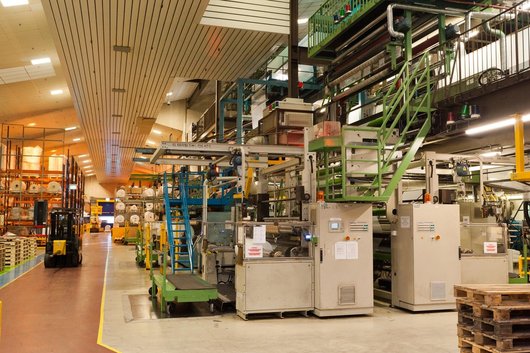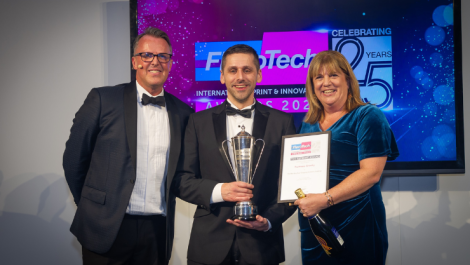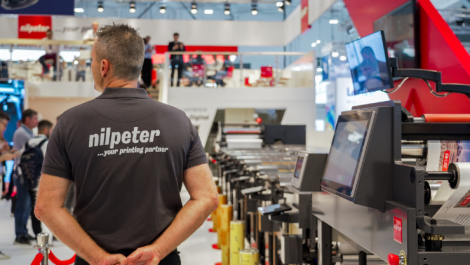As a division of British Polythene Industries, a leading European manufacturer of polyethylene film, bpi.films prides itself on being at the forefront of innovation in its field and works closely with its customers to provide the exact specification of film for each individual application. Neel Madsen went to Sevenoaks to see blown film extrusion at close range.
Standing in a temperature controlled environment, a series of blown film extrusion lines are working overtime at bpi.films in Sevenoaks in order to supply customers with bespoke polythene films produced for a wide variety of applications. As we walk down the aisles of the warehouse, labels with the names of many flexographic packaging printing companies can be seen on the ready to ship reels of films that fill the space. No generic films are made here, only made to order products, engineered films developed in close cooperation with the customer to ensure that the film is fit for purpose, fulfils the needs of the product it is intended for and meets cost requirements.
Commercial director, Mark Vernon, said, ‘We are very much customer led. The customer comes to us with an application, specifying what the properties of the film need to be and we will then develop a film, based on our experience, for that particular purpose.’
Once the film has been trialled and is fully approved, the specification is set in stone and bpi.films guarantees that the same film with the exact same specifications can be consistently supplied next week, next month or next year.
One vision several divisions
Originally Otford Plastics, the Sevenoaks facility has been part of British Polythene Industries plc (BPI) since 1989, and together with its sister site in Bromborough, in Merseyside, employs over 200 staff and produces in excess of 50,000 tonnes of film each year.
The two sites are slightly different in terms of their target market, but both are blown film specialists and work to the same high standard. No matter what the application, all films produced are made to food grade standard, using a number of different polymer types from suppliers both in the UK and Europe.
bpi.films supplies the flexographic printing industry, as well as many other sectors, with a broad range of converter and lamination polythene films. The Sevenoaks manufacturing facility focuses on films for lamination and liquid packaging. These are mainly used in the food sector, but also provide technical solutions for other markets. Over 500 different variations of lamination film in a variety of colours, opaque shades and tints can be supplied. Liquid packaging films are used for anything from the inner sealing film of small retail wine boxes to part of the barrier lining for huge shipping containers that hold a 1000 litres of wine. Pouches are a growing market as they offer food and drinks manufacturers an opportunity to reduce the amount of packaging compared to more rigid forms, such as cans and jars.
Sevenoaks’ focus on lamination began in the late 1980s and was maintained after BPI took over the company. Continued investment in equipment, innovation, training and operating procedures has kept it at the forefront of development in this market and ensures the best quality possible for its customers.
Operations director, Gary Buchalter, explained that when he first joined around the time of the takeover, the company produced a much wider range of products, but that the strength of being part of the group lies in the fact that each site, over the years, has developed a specific focus.
Other divisions include bpi.visqueen, bpi.consumer VMB, bpi.minster films and bpi.recycled products. Agriculture and horticulture make up 31% of the industries served, with retail food chain a close second at 29%. The remainder is made up of industrial (14%), construction (11%), healthcare and waste services (9%) and non food retail (6%).
Blowing big bubbles
Polyethylene (PE) films are known for their exceptional sealing characteristics – they seal at a lower temperature than many other types, provide a good hermetic seal and benefit from a wider sealing range. They also perform well as a moisture barrier and are used widely in food packaging. bpi.films use some 60 different types of PE polymers that all have their own specific characteristics and can be combined to suit the application, costs and needs of the customer.
Blown film is produced from PE granulates, and other additives, that are transformed into a plastic melt by heating them up to between 160 and 200 degrees centigrade. The material then goes through a homogenising process and is extruded through an annular die to form a thin walled tube which is blown up with air, like a bubble, to its required wall thickness. When the film has solidified after being blasted with chilled air, the tube is collapsed and removed via nip rollers. The double-layered sheet is then slit to form two separate layers of film.
In order for the film to move smoothly without drag or friction, a ‘slip modifier’, such as Erucamide, is added during process. This is not absorbed into the film but migrates to the surface, so it is important that the right amount is used otherwise lamination and/or printing may fail.
PE film also has a low surface tension and consequently the chemistry of the surface has to be modified in order for ink and adhesives to adhere and for lamination to be successful. This is done by corona discharge treatment where the film passes through a high voltage field. The treatment has to be tailored to the process for that particular job and its intended use.
Check every reel
Production variables, ie blend composition, average thickness and thickness variation, are computer controlled continuously and stringent quality checks are carried out at all stages, including web inspection on all extrusion lines. All lines have closed loop computer control and additive addition is controlled by gravimetric dosing of master batches.
Instead of having to send samples for testing elsewhere, these can be tested in house as investment in analytical equipment has been significant. ‘Customers often remark on the technical facilities we have available here,’ said Mr Vernon. ‘We are able to offer technical backup and full traceability of all our products as and when it is needed. Our films are used in some extremely demanding applications and the consequential cost of failure can be very high.’
Each set of reels is checked and records kept for several years along with a physical sample, which is stored for 12 months. The operators have full responsibility for the products produced on their shift and have to sign them all off as part of the scheme of total traceability that has been put in place.
Mr Buchalter said, ‘Blend control and traceability are extremely important factors for us. Should problems arise for our customers, we can track back through our records and establish exactly what has caused the issue.’
Reducing variation
The substrate is a vital part of the printing process, and just as the plates, the anilox rollers and the ink need to be fit for purpose, so does the film. Consistency of the product is paramount, and for bpi.films reduction in variation of the products produced is vital.
The company’s approach is quite simply to engineer out problems, such as variation in the ambient temperature in the production environment. Using the ambient air meant that output rate was significantly higher in winter as the temperature of the air used to cool the film bubble was naturally lower than in the summer. The solution was to install a large chiller plant that allows the temperature to be regulated thereby enabling the output rate to be kept constant.
Other issues that have caused variation in the past include additives in materials from polymer suppliers. Here the solution was to have all materials supplied without additives and invest in systems that would add the additives accurately, thereby keeping full control of the process in house.
Similarly, the company has invested in measuring equipment to check the level of gels (visible imperfections), which in the past had been the biggest source of customer complaint, and it worked closely with suppliers to reduce this phenomenon to a minimum.
Green award
The BPI Group is the largest recycler of PE film waste in Europe recycling over 68,000 tonnes of post-use PE material from commercial, retail, industrial and agricultural markets. It won the Sustainability Award at the Scotland plc Awards 2011. The business was recognised for its long term focus on sustainability as demonstrated by several projects including the UK’s first fully closed loop farm plastics recycling scheme, the development of a reusable plastic core initiative and the advancements it has made in film downgauging.
In line with the general trend in packaging, the company’s products have reduced in weight by 5000 tonnes per annum over like for like volumes five years ago. The drivers behind downgauging are several, said Mr Vernon. Customers want to reduce the environmental impact of packaging, but it is perhaps also a reaction to the escalation in polyester costs that happened last year and an attempt to reduce costs. He concluded, ‘It is, however, important that we remember that the packaging must still be able to fulfil its purpose and protect the product inside. It is an ongoing process and a balancing act.’






